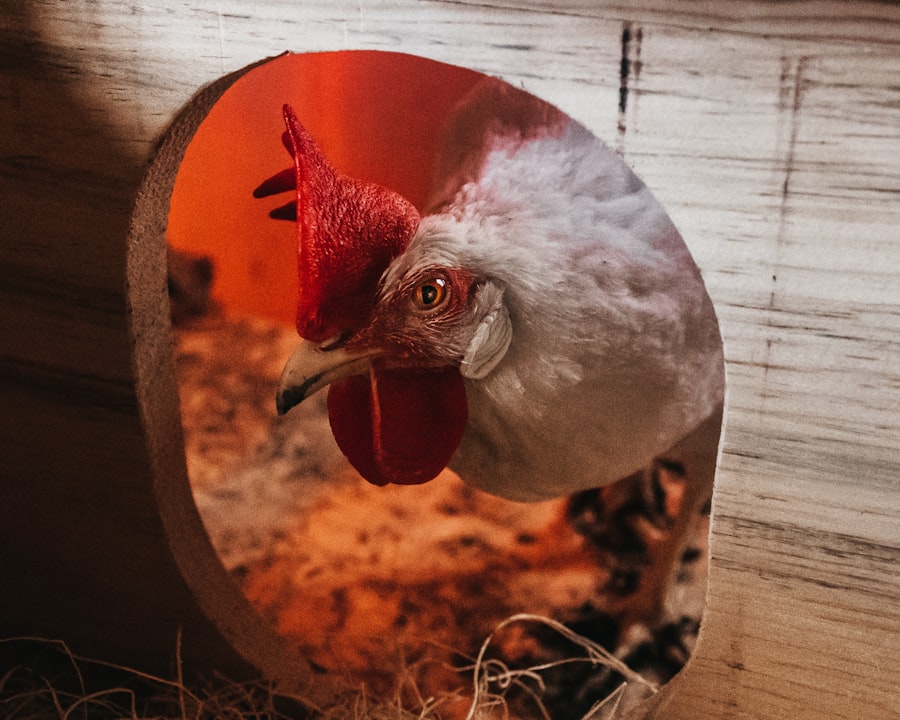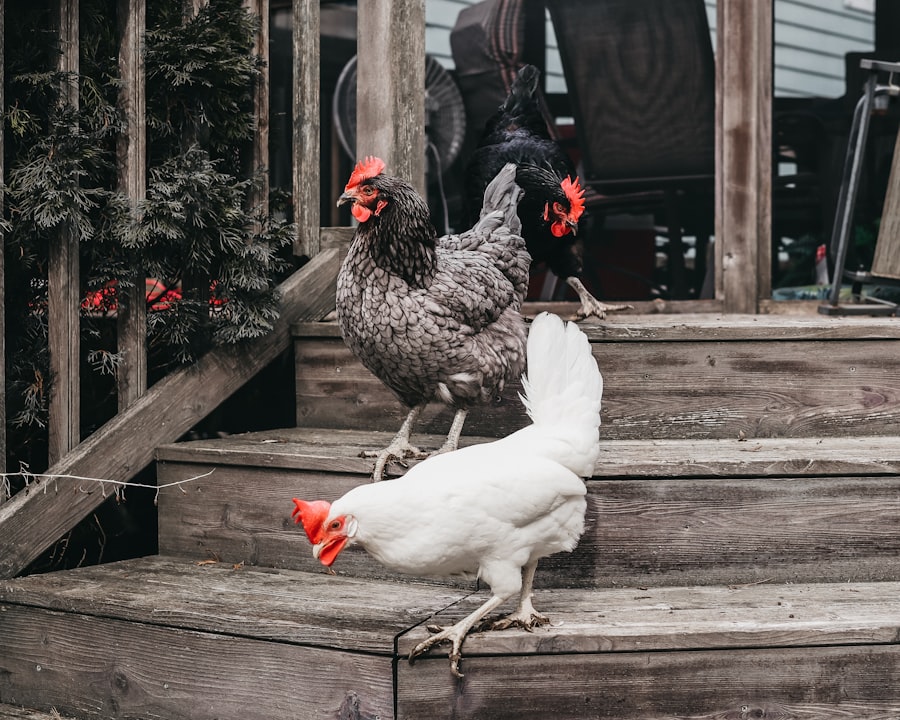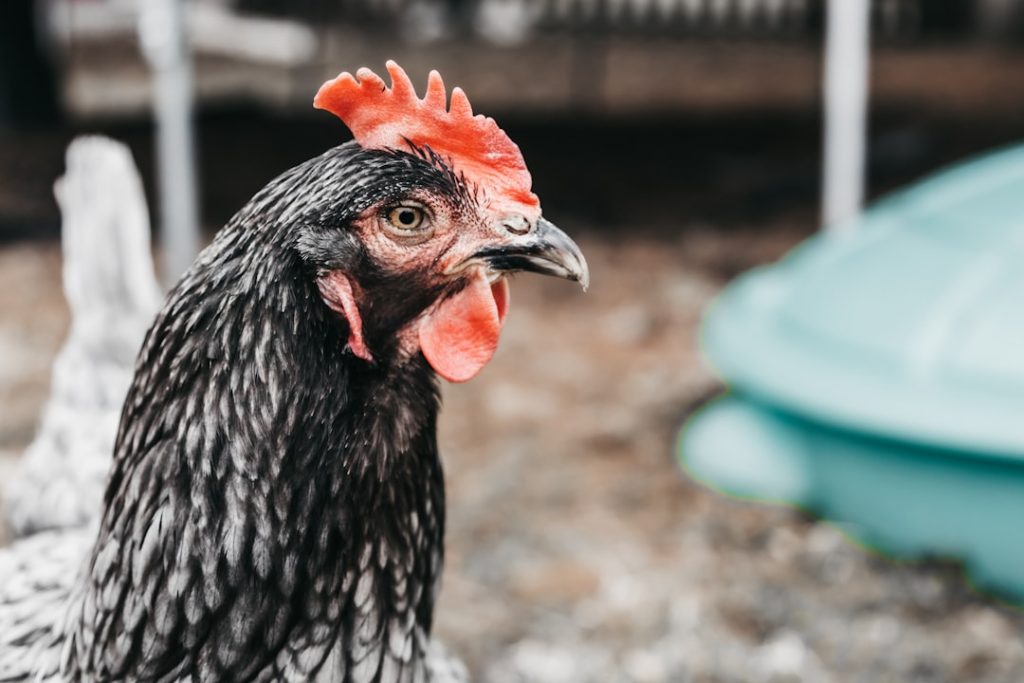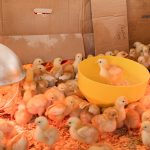Proper coop maintenance is essential for the health and well-being of poultry. Regular inspections of the coop structure are necessary to ensure it remains secure and free from potential hazards. Checking for signs of wear and tear, such as loose boards or rusty hardware, and making prompt repairs is crucial.
Predator-proofing the coop is also important, which may involve installing secure latches on doors and windows, as well as burying wire mesh around the perimeter to deter digging predators. Keeping the coop clean and free from debris is equally important. This includes regularly removing cobwebs, dust, and droppings from the interior.
The exterior of the coop should be maintained by keeping vegetation trimmed and removing debris that could provide hiding spots for predators. By maintaining a clean and secure coop, poultry owners can help ensure the safety and comfort of their flock.
Table of Contents
Key Takeaways
- Regularly clean and maintain the coop to ensure the health and safety of the chickens.
- Establish a regular cleaning schedule to keep the coop free from dirt, debris, and potential health hazards.
- Choose appropriate bedding materials for the coop to provide comfort and absorb moisture.
- Ensure proper ventilation and airflow in the coop to prevent the buildup of harmful gases and maintain a healthy environment.
- Implement effective waste management practices to keep the coop clean and reduce the risk of disease.
- Use odor control products to minimize unpleasant smells and maintain a pleasant environment for both chickens and caretakers.
- Implement pest control measures to prevent infestations and protect the health of the chickens.
Regular Cleaning Schedule
Regular Bedding Changes
Establishing a regular cleaning schedule for your coop is crucial for maintaining a healthy environment for your poultry. This includes removing soiled bedding and replacing it with fresh material on a regular basis. The frequency of bedding changes will depend on the size of your flock and the type of bedding used, but generally, it is recommended to clean the coop at least once a week.
Deep Cleaning and Disinfecting
In addition to changing the bedding, it is important to thoroughly clean and disinfect the coop on a regular basis to prevent the buildup of harmful bacteria and parasites. During the cleaning process, it is important to remove all feed and water containers from the coop and thoroughly scrub them with hot, soapy water. Additionally, all surfaces inside the coop should be cleaned with a poultry-safe disinfectant to kill any harmful pathogens.
Benefits of a Regular Cleaning Schedule
By establishing a regular cleaning schedule, you can help to prevent the spread of disease and maintain a clean and healthy environment for your flock.
Bedding Choices

Choosing the right bedding for your coop is essential for providing a comfortable and healthy environment for your poultry. There are several different options available, including straw, wood shavings, and shredded paper, each with its own set of benefits and drawbacks. Straw is a popular choice for bedding as it is affordable, readily available, and provides good insulation.
However, it can be difficult to clean and may harbor mold and mites if not changed regularly. Wood shavings are another common choice for coop bedding, as they are absorbent and easy to clean. However, it is important to use only untreated shavings to avoid exposing your flock to harmful chemicals.
Shredded paper is a more eco-friendly option for bedding, as it can be composted after use. However, it may not provide as much insulation as other types of bedding. Ultimately, the best bedding choice for your coop will depend on your specific needs and preferences.
It is important to consider factors such as cost, availability, and ease of cleaning when selecting bedding for your flock.
Ventilation and Airflow
Proper ventilation and airflow are essential for maintaining a healthy environment inside the coop. Good ventilation helps to remove excess moisture, ammonia, and other harmful gases that can build up inside the coop and cause respiratory issues for your flock. Additionally, adequate airflow helps to regulate temperature and prevent the buildup of harmful pathogens.
To ensure proper ventilation and airflow, it is important to provide adequate ventilation openings in the coop, such as windows, vents, or eaves. These openings should be positioned to allow for cross-ventilation and should be covered with wire mesh to prevent predators from entering the coop. Additionally, it is important to avoid overcrowding the coop, as this can lead to poor air quality and increased risk of disease.
By providing proper ventilation and airflow in the coop, you can help to maintain a healthy environment for your flock and reduce the risk of respiratory issues and disease.
Waste Management
Proper waste management is essential for maintaining a clean and healthy environment inside the coop. This includes regularly removing soiled bedding and waste material from the coop and disposing of it properly. Additionally, it is important to keep feed and water containers clean to prevent the buildup of harmful bacteria.
One effective method of waste management is composting soiled bedding and waste material. Composting not only helps to reduce waste but also produces nutrient-rich compost that can be used to fertilize gardens and landscaping. To compost waste from the coop, simply create a designated compost pile or bin and add soiled bedding, waste material, and other organic matter.
Over time, the compost will break down into a rich soil amendment that can be used to improve soil quality. By implementing proper waste management practices, you can help to maintain a clean and healthy environment for your flock while also reducing waste and producing valuable compost for your garden.
Odor Control Products

Natural Odor Control Options
Diatomaceous earth is a natural mineral powder that absorbs moisture and controls odors inside the coop. It is safe to use around poultry and can be sprinkled on the floor or added to the bedding to control odors. Baking soda is another natural option that can be used to neutralize odors in the coop.
Commercial Odor Control Products
Commercial odor control products are specifically designed for use in poultry coops. These products neutralize odors and control moisture without harming your flock.
Benefits of Using Odor Control Products
By using odor control products in the coop, you can maintain a fresh and pleasant environment for your flock while reducing the risk of respiratory issues associated with poor air quality.
Pest Control Measures
Pest control measures are essential for protecting your flock from unwanted visitors such as rodents, insects, and other pests that can pose a threat to their health and safety. There are several different pest control measures that can be implemented in the coop to deter pests and prevent infestations. One effective pest control measure is to keep the coop clean and free from spilled feed, which can attract rodents and insects.
Additionally, it is important to store feed in secure containers that are inaccessible to pests. Regularly inspecting the coop for signs of pests such as droppings or damage to feed containers can help to identify potential issues before they become a major problem. In addition to maintaining a clean environment, there are several pest control products available that can help to deter pests from entering the coop.
These products include traps, baits, and repellents that are specifically designed for use in poultry coops. By implementing pest control measures in the coop, you can help to protect your flock from unwanted visitors while maintaining a clean and healthy environment for their well-being.
If you’re looking for tips on how to keep chickens from stinking, you might also be interested in learning about the incubation period for goose eggs. Check out this article to expand your knowledge on poultry care and breeding.
FAQs
What are some common causes of chicken coop odor?
Some common causes of chicken coop odor include accumulated droppings, wet bedding, and poor ventilation.
How can I prevent my chicken coop from smelling bad?
To prevent your chicken coop from smelling bad, you can regularly clean out droppings and soiled bedding, ensure good ventilation, use odor-absorbing materials like straw or wood shavings, and maintain a dry environment.
What are some natural ways to reduce chicken coop odor?
Some natural ways to reduce chicken coop odor include using herbs like lavender or mint, adding lime to the coop bedding, and using apple cider vinegar in the chickens’ water to help reduce odor.
How often should I clean my chicken coop to prevent odor?
It is recommended to clean your chicken coop at least once a week to prevent odor. This includes removing droppings, soiled bedding, and ensuring good ventilation.
Are there any specific chicken breeds that produce less odor?
While all chickens produce waste and can contribute to coop odor, some breeds are known to be less smelly than others. Breeds like Silkies, Orpingtons, and Sussex are often noted for producing less odor.
Meet Walter, the feathered-friend fanatic of Florida! Nestled in the sunshine state, Walter struts through life with his feathered companions, clucking his way to happiness. With a coop that’s fancier than a five-star hotel, he’s the Don Juan of the chicken world. When he’s not teaching his hens to do the cha-cha, you’ll find him in a heated debate with his prized rooster, Sir Clucks-a-Lot. Walter’s poultry passion is no yolk; he’s the sunny-side-up guy you never knew you needed in your flock of friends!







